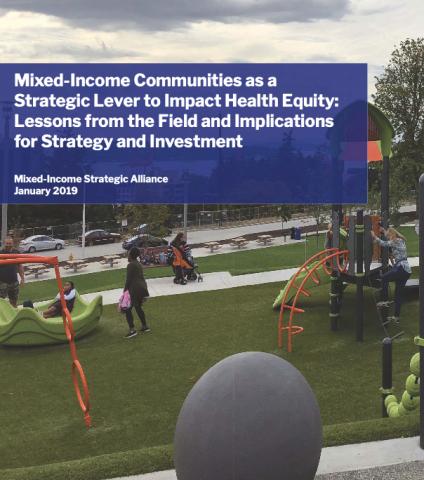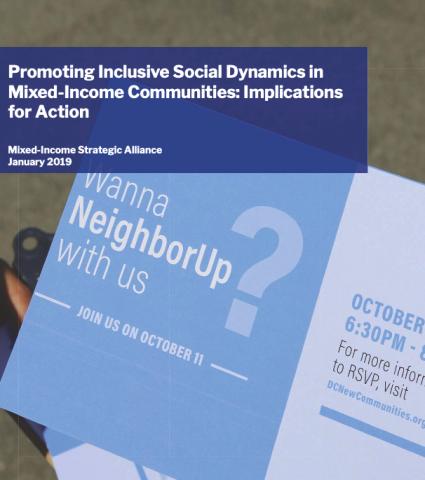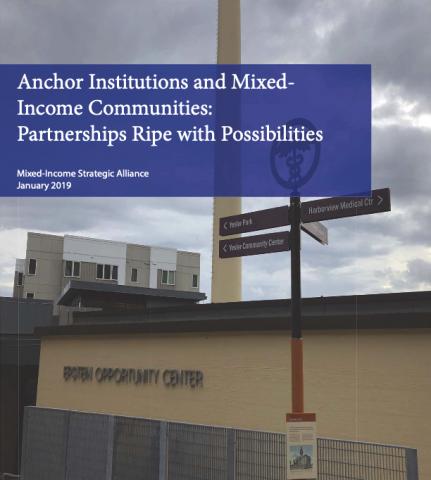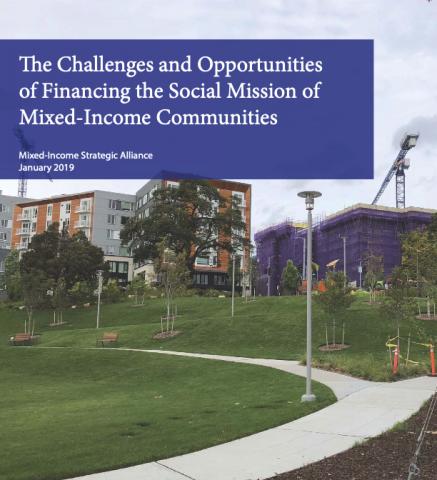Enhancing and Sustaining Mixed-Income Community Interventions
In 2015, the National Initiative on Mixed-Income Communities, the Center for the Study of Social Policy, and Urban Strategies, Inc. formed the Mixed-Income Strategic Alliance to help improve, accelerate and better track the progress of efforts to develop equitable and inclusive mixed-income communities.
The reports below are the result of our exploration of current knowledge and exemplary practice across the mixed-income community transformation field.
Mixed-Income Community Interventions and Health
The following reports explore health strategies in current mixed-income efforts.
Final Report
Mixed-Income Communities as a Strategic Lever to Impact Health Equity: Lessons from the Field and Implications for Strategy and Investment
This report provides an overview of the current state of knowledge about mixed-income communities and health and synthesizes key findings and implications from the five site profiles below.
Site Profiles
These site profiles spotlight mixed-income community transformations that emphasize health and wellness in their redevelopment processes and strategic interventions.
- Avondale, Cincinnati, OH
- Church Hill North, Richmond, VA
- HOPE SF, San Francisco, CA
- Mariposa, Denver, CO
- Yesler Terrace, Seattle, WA
Inclusive Social Dynamics
Our research and experience suggests that many community-building strategies in mixed-income settings often do not go far enough to address conditions of social isolation and exclusion. In order to cultivate an inclusive community where everyone feels they belong and can thrive, successful mixed-income interventions must address individual perceptions and aspirations, social relationships, and power and influence dynamics.
Promoting Inclusive Social Dynamics in Mixed-Income Communities: Promising Practices
This report considers the key challenges of promoting inclusive social dynamics in mixed-income communities, presents key elements and approaches to achieve greater success, and highlights four promising efforts - trauma-informed community building, Trusted Space Partners’ community network-building, Kindred’s parent cohort groups in mixed-race, mixed-income schools, and Regent Park’s inclusive governance models - to advance these approaches.
Promoting Inclusive Social Dynamics in Mixed-Income Communities: Implications for Action
This report proposes specific implications for action to help guide practitioners, policymakers, funders, researchers, residents, and community members.
Promoting Inclusive Social Dynamics in Mixed-Income Communities: Conceptual Framework
This framework examines exclusionary and inclusionary pathways that lead to different processes and outcomes in mixed-income settings. The purpose of this framework is to enhance understanding about how to promote more inclusive social dynamics at the individual, social, and structural levels.
Anchor Institutions
This report explores the strategic role of anchor institutions, highlighting key opportunities and challenges for local partnerships between educational and medical institutions and mixed-income communities.
Anchor Institutions and Mixed-Income Communities: Partnerships Ripe with Possibilities
Financing Innovation
This report explores questions about sustainable financing in the mixed-income context, including what resources can be leveraged from partners and investors to advance human capital and community building priorities.
An Exploration of the Challenges and Opportunities of Financing the Social Mission of Mixed-Income Communities
Special thanks to Jessica Pika at the Center for the Study of Social Policy for her creative eye and design expertise that enabled us to produce each of these reports.





